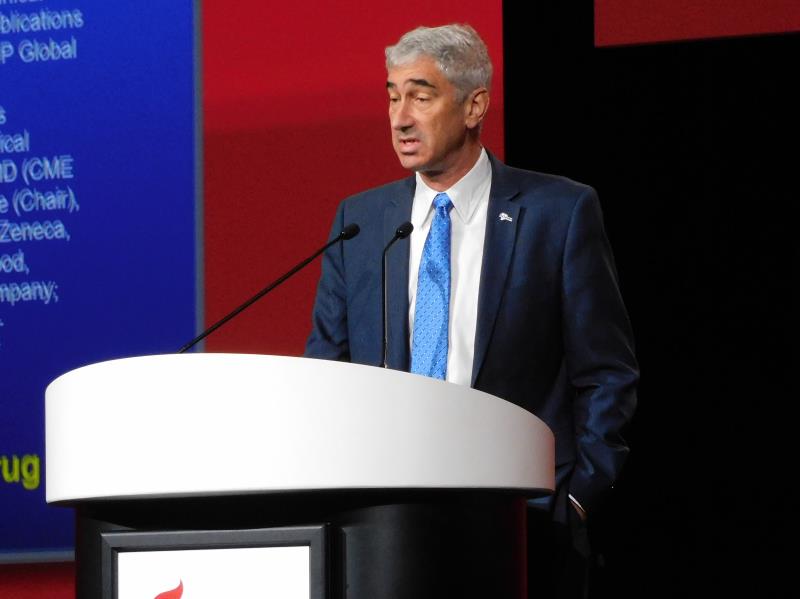 Dr Matthew Budoff discussing the results of the EVAPORATE trial.
Dr Matthew Budoff discussing the results of the EVAPORATE trial.Icosapent ethyl (IPE), a purified form of the omega-3 fatty acid eicosapentaenoic acid (EPA), slowed the progression of plaque in statin-treated patients with coronary atherosclerosis, according to the interim results of the EVAPORATE* trial presented at AHA 2019.
“The basis of EVAPORATE is the … REDUCE-IT** trial … which demonstrated a 25-percent event reduction with IPE. We undertook this study to look at a mechanistic approach to try to understand [the] reduction in CV events [in] REDUCE-IT,” said study investigator Dr Matthew Budoff from Lundquist Institute and UCLA School of Medicine in Torrance, California, US.
To determine whether IPE does reduce plaque progression, 80 individuals were randomized 1:1 to receive either IPE 4 g daily or placebo (mineral oil) for 18 months. Of these, 67 completed the 9-month visit. Apart from stable statin therapy, participants must have low-density lipoprotein cholesterol levels of 40–115 mg/dL and triglyceride levels of 135–499 mg/dL. [AHA 2019, abstract LBS.06]
Although IPE slowed the progression of low-attenuation plaque by 21 percent at 9 months, it did not reach statistical significance (p=0.469). Nonetheless, Budoff was quick to point out that this is not unexpected as the trial was powered for an 18-month endpoint.
Of note was the significantly reduced progression in total plaque by 42 percent (p=0.0004), as well as other plaque metrics such as total noncalcified plaque (19 percent; p=0.010), fibrous plaque (57 percent; p=0.011), and calcified plaque (89 percent; p=0.001) with IPE vs placebo.
“[The reductions in] total plaque [progression is important] because this approximates what we have been using for intravascular ultrasound as total atheroma volume for many years … Increasing plaque volume has been associated with CV events,” said Budoff.
The effects were consistent across multiple subgroups including the spectrum of baseline triglycerides, he added.
Given evidence showing the potential of CTA***-verified plaque progression as a strong predictor of a future cardiovascular (CV) event, [J Am Coll Cardiol 2015;66:337-346] the current findings highlight the role of CTA-verified plaque progression as an important marker for evaluating CV risk, underscored Budoff.
The mineral oil issue
Concerns have been raised about mineral oil being used as placebo, hence the comparison between the current findings and another placebo-controlled trial that used cellulose as placebo. No significant differences were observed in terms of total or noncalcified plaque progression, be it under the influence of mineral oil or cellulose. “I think this is very reassuring that … the [reduced] plaque progression seen in EVAPORATE … were associated with IPE and not a potential harm from mineral oil,” said Budoff.
Can plaque EVAPORATE?
While IPE failed to modify the primary endpoint, and despite the short follow-up period and small study cohort, the beneficial effects on several secondary endpoints should be taken into account, noted discussant Professor Stephen Nichols from Monash University in Melbourne, Australia. “The effect on total plaque volume is promising … More clinical trials will be required [to ascertain the findings].”
“It is important to note that … there was no evaporation of plaque in the study. All plaque features progressed, [which] reiterates the importance of high triglyceride levels and progressive CV risk,” he continued.
Further studies should explore alternative omega-3 fatty acid formulations that might have CV benefits and establish specific patient subgroups that could benefit from IPE, added Nichols.
The study will continue to 18 months as planned.